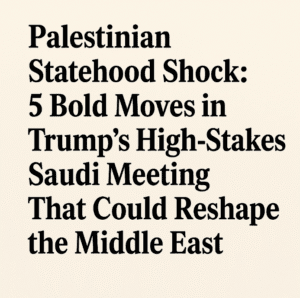Palestinian Statehood Shock: 5 Bold Moves in Trump’s High-Stakes Saudi Meeting That Could Reshape the Middle East
A high-stakes meeting between Donald Trump and Saudi Crown Prince Mohammed bin Salman in Riyadh this week has drawn global attention, as reports suggest the inclusion of Palestinian, Lebanese, and Syrian leaders. The meeting highlights Saudi Arabia’s insistence on Palestinian statehood as a prerequisite for normalizing relations with Israel, a stance Trump had previously downplayed. The push for statehood is tied to regional leadership ambitions, post-Gaza war realities, and Saudi nuclear ambitions.
Trump now faces the challenge of reconciling Saudi demands with Israeli resistance, particularly from Prime Minister Netanyahu. With Lebanon and Syria also involved, the talks could reshape broader regional security dynamics, including tensions with Iran. The outcome may either unlock progress toward normalization or further complicate Middle East diplomacy. This summit will test whether the pursuit of Palestinian statehood remains central to Arab-Israeli relations or if it will continue to be sidelined.

Palestinian Statehood Shock: 5 Bold Moves in Trump’s High-Stakes Saudi Meeting That Could Reshape the Middle East
A pivotal meeting in Riyadh this week between former U.S. President Donald Trump and Saudi Crown Prince Mohammed bin Salman is drawing global attention, as reports suggest the inclusion of Palestinian Authority (PA) President Mahmoud Abbas, Lebanon’s Joseph Aoun, and Syria’s Ahmed al-Sharaa. The gathering underscores Saudi Arabia’s renewed push to link normalization with Israel to Palestinian statehood—a condition Trump previously downplayed but now appears central to regional negotiations. Here’s a deeper look at the stakes, challenges, and potential ripple effects.
The Saudi Gambit: Statehood as a Non-Negotiable
According to sources cited by Al-Quds, Crown Prince bin Salman seeks Trump’s endorsement of Palestinian statehood as a prerequisite for formalizing Saudi-Israel relations. This aligns with Riyadh’s long-standing public stance but contrasts with Trump’s 2025 claim that Saudi Arabia had “dropped” the demand—a statement swiftly denied by the Kingdom.
Why Now?
- Regional Leadership: Saudi Arabia aims to reclaim its role as a broker in Arab-Israeli peace, balancing ties with Washington while addressing domestic and pan-Arab sentiment sympathetic to Palestinians.
- Post-Gaza War Realities: The October 2023 Hamas attack and subsequent war stalled earlier normalization momentum. Riyadh may view statehood as a stabilizer to mitigate future conflicts.
- Nuclear Ambitions: Reports suggest Trump has decoupled Saudi nuclear program progress from normalization, freeing Riyadh to assert its terms.
Trump’s Tightrope: Legacy vs. Realpolitik
Trump’s visit—which notably excludes Israel—highlights his unorthodox approach to Middle East diplomacy. While he previously brokered the Abraham Accords, his administration’s 2020 peace plan (rejected by Palestinians and Israeli hardliners) offered limited autonomy, not full statehood. Now, Trump faces pressure to reconcile Saudi demands with Israeli Prime Minister Benjamin Netanyahu’s rejection of PA governance in Gaza or the West Bank.
Key Challenges:
- Netanyahu’s Resistance: Israel’s government opposes PA involvement in Gaza, citing incitement and “pay-for-slay” policies (though Abbas claims reforms).
- Gaza’s Future: Competing visions—from Trump’s reported resort-city plan to Egypt’s PA-led proposal—remain unresolved amid ceasefire delays.
- Regional Skepticism: Lebanon and Syria’s inclusion signals broader security concerns, including Hezbollah’s influence and Iranian entrenchment, complicating a unified Arab front.
Beyond Palestine: Lebanon and Syria’s Roles
The participation of Lebanon’s Aoun and Syria’s al-Sharaa adds layers to the talks:
- Lebanon: Seeks Israeli withdrawal from disputed border areas, critical amid ongoing low-level clashes since the 2023 ceasefire.
- Syria: Al-Sharaa, leading a post-Assad transition, demands an end to Israeli strikes targeting Iranian assets—a reminder of Syria’s fragility and Iran’s shadow.
Implications: Saudi Arabia may leverage these issues to frame normalization as part of a broader regional détente, addressing security while isolating Iran.
The Path Ahead: Scenarios and Stumbling Blocks
- Scenario 1: Trump endorses statehood, pressuring Netanyahu to soften his stance. This risks fracturing Israel’s coalition but could unlock Saudi normalization.
- Scenario 2: A vague commitment emerges, delaying statehood talks while advancing bilateral U.S.-Saudi deals (e.g., defense, nuclear energy).
- Wildcard: Hamas or Hezbollah actions could upend diplomacy, as seen in 2023.
Conclusion: A Defining Moment for Middle East Diplomacy
This meeting represents more than a photo-op—it’s a litmus test for whether Israeli-Palestinian peace remains integral to Arab-Israeli normalization. For Trump, balancing Saudi ambitions with Israeli politics will require nuanced deal-making. For Riyadh, the gamble lies in advocating for Palestinians without alienating a potential Israeli partner. As Gaza smolders and regional alliances shift, the outcome could redefine Middle East geopolitics for decades.
While Palestinian statehood is often dismissed as a fading issue, Saudi Arabia’s insistence proves it remains a cornerstone of Arab consensus. The Riyadh summit may reveal whether symbolic gestures can evolve into tangible progress—or if the cycle of conflict and stalled talks will persist.
You must be logged in to post a comment.